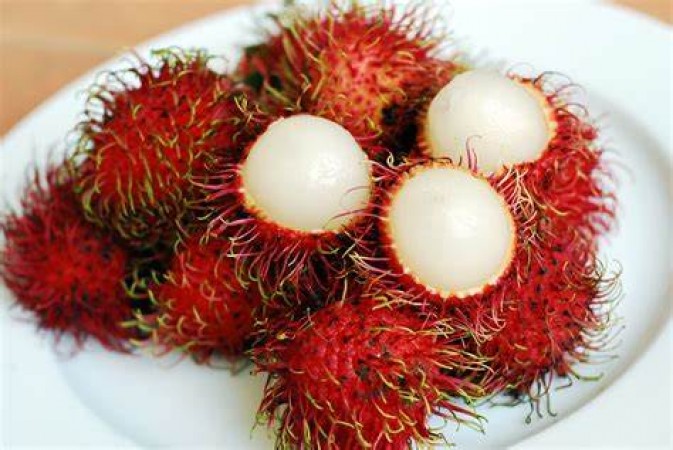
Rambutan, a tropical fruit known for its sweet and juicy flesh, has recently garnered attention due to its potential connection to the Nipah virus. In this article, we'll delve into what Rambutan is, its unique characteristics, and why it's being discussed in relation to the Nipah virus outbreak.
Rambutan (Nephelium lappaceum) is a tropical fruit native to Southeast Asia, commonly found in countries like Indonesia, Malaysia, Thailand, and the Philippines. It belongs to the Sapindaceae family and is closely related to other tropical fruits like lychee and longan. The fruit got its name from the Malay word "rambut," which means "hair," owing to the spiky, hair-like protrusions on its skin.
Rambutan is a small, round fruit with a leathery skin covered in soft, hair-like spines. The skin can be red, yellow, or green, depending on the variety. Once you peel away the skin, you reveal the translucent, juicy flesh, which is sweet and slightly acidic, resembling the taste of lychee.
Before we delve into the connection, let's briefly understand what the Nipah virus is.
Nipah virus is a zoonotic virus, meaning it can be transmitted from animals to humans. It was first identified in Malaysia in 1998 when it caused an outbreak among pig farmers. The virus can lead to severe respiratory illness and encephalitis (brain inflammation) in infected individuals. Nipah virus is primarily transmitted through the consumption of contaminated fruits, especially fruits that have been bitten or licked by infected fruit bats.
Fruit bats, also known as flying foxes, are considered the natural reservoir of the Nipah virus. These bats often feed on various fruits, including Rambutan, by biting into the fruit to extract the juice.
The concern arises when infected fruit bats come into contact with Rambutan trees or fruit orchards. Their saliva, urine, or droppings can potentially contaminate the fruit with the virus. If these contaminated fruits are consumed by humans without proper washing or handling, there is a risk of Nipah virus transmission.
Over the years, several Nipah virus outbreaks have been linked to the consumption of fruits, although most cases have been associated with date palm sap in South Asia. However, the potential link between Rambutan and Nipah virus has prompted increased surveillance in regions where both the fruit bats and the fruit are prevalent.
Rambutan is gaining attention in the context of Nipah virus discussions for several reasons:
Regions where Rambutan is grown and consumed often coincide with areas inhabited by fruit bats carrying the Nipah virus. This geographic overlap raises concerns about the potential risk of transmission.
Public health authorities and researchers are keen on understanding how the Nipah virus spreads and identifying potential sources of infection. Rambutan, as a fruit consumed by many, is one such source under scrutiny.
To mitigate the risk of Nipah virus transmission, health agencies recommend thorough washing and peeling of fruits, including Rambutan. Additionally, avoiding fruits that show signs of bat-related damage can further reduce the risk. In conclusion, Rambutan is a delectable tropical fruit that has come under the spotlight due to its potential connection to the Nipah virus. While there is a geographic overlap between Rambutan cultivation and fruit bat habitats, it's important to note that the risk of Nipah virus transmission can be minimized through proper fruit handling and hygiene practices. As researchers continue to study this potential link, it underscores the importance of vigilance and awareness when enjoying the flavors of tropical fruits like Rambutan.
The Sizzle and Flip Side of Cheeseburgers: Health Advantages and Disadvantages
Eating These Foods Repeatedly Leads to Fatigue, Stay Away Today!
If you want to enjoy Punjabi food, then make Chole Bhature at home